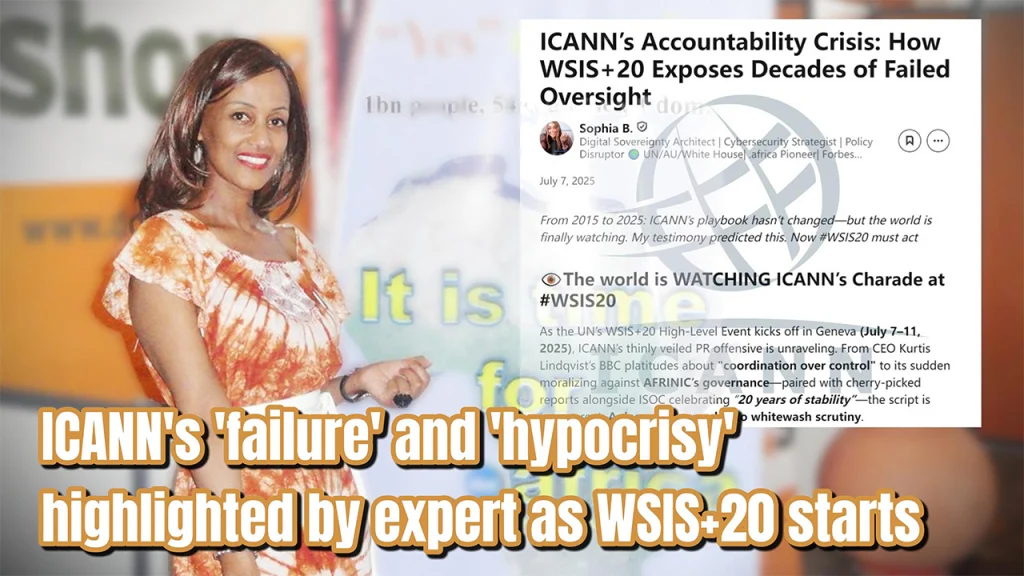- Digital sovereignty expert has called out ICANN’s hypocrisy with WSIS+20, linking its attacks on AFRINIC to its historic misconduct in the .Africa domain saga.
- WSIS+20 emerges as a critical inflection point, where calls to overhaul ICANN’s oversight model are growing louder amid mounting evidence of multi-stakeholder governance failure.
AFRINIC: The catalyst that backfired
As ICANN attempts to control the narrative at the UN’s WSIS+20 summit, digital sovereignty advocate Sophia Bekele has revived long-buried evidence of systemic manipulation, exposing the organisation’s selective moralism and a legacy of impunity.
At the UN’s WSIS+20 High-Level Event in Geneva, a familiar face in internet governance circles has stepped back into the spotlight. Sophia Bekele, the digital sovereignty campaigner, has published a damning exposé on LinkedIn, accusing the Internet Corporation for Assigned Names and Numbers (ICANN) of orchestrating a years-long cover-up of election interference, institutional capture, and failed oversight.
The post, published on 7 July—the opening day of the summit—sharply critiques ICANN’s ongoing public relations campaign. While ICANN’s new CEO Kurtis Lindqvist took to the BBC and international fora touting “coordination over control,” Bekele argues the organisation is simply deflecting scrutiny from a structural crisis that is now finally receiving global attention.
“This PR blitz isn’t about stewardship—it’s a last-ditch effort to gaslight the public,” Bekele wrote, warning that ICANN’s self-proclaimed multistakeholderism has, in practice, become “cabal governance by another name.”
The catalyst for Bekele’s renewed critique is ICANN’s June 2025 public condemnation of AFRINIC—the African Network Information Centre—for election rigging and governance misconduct. While ICANN demanded transparency and fairness, Bekele alleges this is the same behaviour ICANN itself enabled when it colluded with AFRINIC allies to sabotage DCA’s .Africa bid in 2015.
In a historic Independent Review Process (IRP) ruling that year, ICANN was found to have violated its bylaws by inventing endorsement requirements, ghostwriting African Union support letters for a applicant (ZACR), and enabling smear campaigns against DCA. Despite the ruling, ICANN awarded .Africa to ZACR—an action Bekele calls “a gangster governance playbook.”
Now, Bekele argues, AFRINIC has become ICANN’s scapegoat. “ICANN built the cabal, then turned on its Frankenstein when it rebelled,” she writes, calling out the irony of ICANN attacking the very actors it once empowered.
Also read: EXPOSED: The letter that reveals who was really benefitting from AFRINIC’s lawsuits
A 10-year arc of warnings ignored
Bekele’s post also draws on her 2015 Congressional testimony during the IANA transition debates, where she warned of “FIFA-like corruption” and urged lawmakers not to trust ICANN to police itself. Her prediction that an unregulated ICANN would foster systemic abuse, she now argues, has been validated by both the .Africa debacle and the AFRINIC collapse.
“Only proper regulation by an independent agency with full Congressional mandate will ensure that a ‘FIFA-Mafia type’ organisation of systematic corruption does not emerge,” she wrote at the time.
The issue, according to Bekele, is not merely one of past misconduct, but of a structure that enables continuous abuse. She points to ICANN’s approval of controversial decisions—such as the failed .ORG sale in 2019 and selective enforcement of governance norms—as proof that the multi-stakeholder model lacks meaningful accountability.
Also read: Is the AFRINIC election process compliant with Mauritian corporate law?
WSIS+20: Tipping point for internet governance?
WSIS+20 may now serve as a turning point. According to Bekele, three existential threats loom over ICANN:
- Multilateral Oversight: WSIS+20 working groups are actively reviewing multistakeholder models, and some proposals call for transitioning to UN-led mechanisms.
- Legal Precedent: The IRP process, has become a case study in the limits of internal redress. WSIS participants are reportedly revisiting these failures.
- U.S. Congressional Oversight: A potential revival of the Dotcom Act post-2024 elections could reimpose U.S. oversight over ICANN’s activities.
Bekele also raises a strategic concern: if AFRINIC’s elections are overturned based on governance violations, what’s stopping WSIS+20 or a future oversight body from auditing ICANN’s own internal procedures during 2015–2017? “AFRINIC’s collapse proves DCA was right all along,” she states.
Uncomfortable questions for ICANN’s leadership
Kurtis Lindqvist’s recent media appearances have done little to reassure critics. Bekele contrasts his BBC-friendly claim of “coordination, not control” with ICANN’s recent partnership with China’s World Internet Conference—an event she describes as a “Trojan horse for state control.”
The contradiction, she argues, exposes ICANN’s “slogan-first strategy,” where principles of openness and transparency are adopted rhetorically but abandoned in practice. Lindqvist, she notes, was quick to denounce government overreach while aligning with Beijing’s shared cyberspace governance model—raising questions about ICANN’s consistency and integrity.
Also read: AFRINIC staff violated obligations during 2025 election
Five demands at geneva
In her post, Bekele issues five clear demands to the WSIS+20 summit:
- Establish a global internet regulatory authority to oversee ICANN, replacing its self-regulatory model.
- Release all redacted .Africa reports, including evidence of collusion with the African Union Commission.
- Return the .Africa gTLD to DotConnectAfrica, as reparative justice for the flawed delegation.
- Investigate ICANN-AFRINIC collusion under the now-criticised “Africa Strategy.”
- Develop a regional digital governance model, rooted in African sovereignty and inclusive participation.
A reckoning long overdue?
Bekele’s post is more than a personal vindication—it’s a call for systemic overhaul. After a decade of stonewalled accountability and rhetorical deflection, ICANN faces a rare moment of public reckoning. With AFRINIC’s collapse, and voices like Bekele’s are finding renewed relevance.
Whether WSIS+20 acts on these revelations remains to be seen—but for now, the “world is watching,” just as Bekele predicted.

